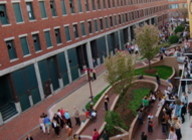ART_IN_ACADEMIA_17143858_thumb.jpg) IS THIS HOW I'M SUPPOSED TO ANSWER? IS THIS HOW I'M SUPPOSED TO ANSWER?by STEVE AISHMAN |
CURATORS_WITH_SPEARS_1182739_thumb.jpg) POSITIVE OR DESTRUCTIVE INTERFERENCE POSITIVE OR DESTRUCTIVE INTERFERENCEby JENNIFER SCHMIDT |
A_POSITIVE_OUTLOOK_118210_thumb.jpg) WEALTH OF RESOURCES WEALTH OF RESOURCESby MEG ROTZEL |
FACT_V_FICTION_1183059_thumb.jpg) FACT V. FICTION FACT V. FICTION by ANNEKA LENSSEN |
IMMATURITY_IN_ARTWORK_1182317_thumb.gif) CULTIVATING ARTISTS CULTIVATING ARTISTSby ANTHONY TUCK |
ART_IN_ACADEMIA_1182839_thumb.jpg) RIGIDITY IN TEACHING THE TRADE RIGIDITY IN TEACHING THE TRADEby JAMES MANNING |
ART_IN_ACADEMIA_1182954_thumb.jpg) THE ARTIST INTELLECTUAL THE ARTIST INTELLECTUALby JAMES NADEAU |
ART_IN_ACADEMIA_1182621_thumb.gif) THE ORIGIN OF ART IN ACADEMIA THE ORIGIN OF ART IN ACADEMIAby RICHARD WOHLFEILER |
ART_STANDARDIZED_TEST_2118486_thumb.jpg) QUIZ ON ART AND ACADEMICS QUIZ ON ART AND ACADEMICSby HEIDI MARSTON |
After a particularly grueling integral calculus test, my classmates and I were given an article to read discussing the role of math as a social filter. The idea is that successful passage through calculus says something about the person you are. Even if the knowledge is inapplicable in your future trade, a grad school (business, law or medicine) will want to see it on your transcript to know whether you’re worth their investment. At the time, I had the distinct feeling that I was being filtered.
I got that feeling again a couple years ago when I finished my undergraduate degree and swore that I would never make myself go to school again. Now most artists that I know are either in art school, applying to it, or working for one: everybody who’s anybody has an MFA. I can see why. My roommate told me galleries don’t want to show work by people without a degree, and it’s definitely more difficult to make your way into an art scene without the connections school provides.
I still can’t bear the thought of dropping thousands of dollars and years of my life for an education that will probably just make me feel oppressed, as school always has. But I wanted to know what I was missing, and how other people felt about it. Is art school a scam? Do artists belong in a university setting? Was all my railing against the patriarchal academic system just a lame cover for being a cheap bastard?
I have wanted to ask these questions since I started writing for Big RED last spring, and now I’ve been able to. The following passage is what I sent to our writers some weeks ago. The responses had little in common except for how strongly the person felt about the topic. I hope it is as enlightening for everyone as it has been for me.
----
In 1956 Ben Shahn gave a series of lectures, the first of which he began, "I have come to Harvard with some very serious doubts as to whether I ought to be here at all." Almost fifty years later many artists find themselves in a similarly ambivalent position vis a vis the institution of academia.
One could argue that art in America is without what you'd call a natural environment and the universities seem like a good choice: artists would be exposed to the width of liberal education and in turn the university could incorporate art into the formation of the "whole" student.
But can this be done without reducing art to an "experience", and thus its students to dilletantes? It seems that the critical nature of academia entirely opposed to that which is creative, emphasizing instead that which is proven or provable, and academics generally treat the artist as someone who doesn't really grasp (and probably can't control) the significance of what he's doing.
Can artists thrive in the hierarchy of academia? Does art school serve its students better? What about graduate degrees? Is teaching college-level art a means to an end the same way waiting tables is? What is the uneasy relationship between artists and the institutions that teach them?
-






